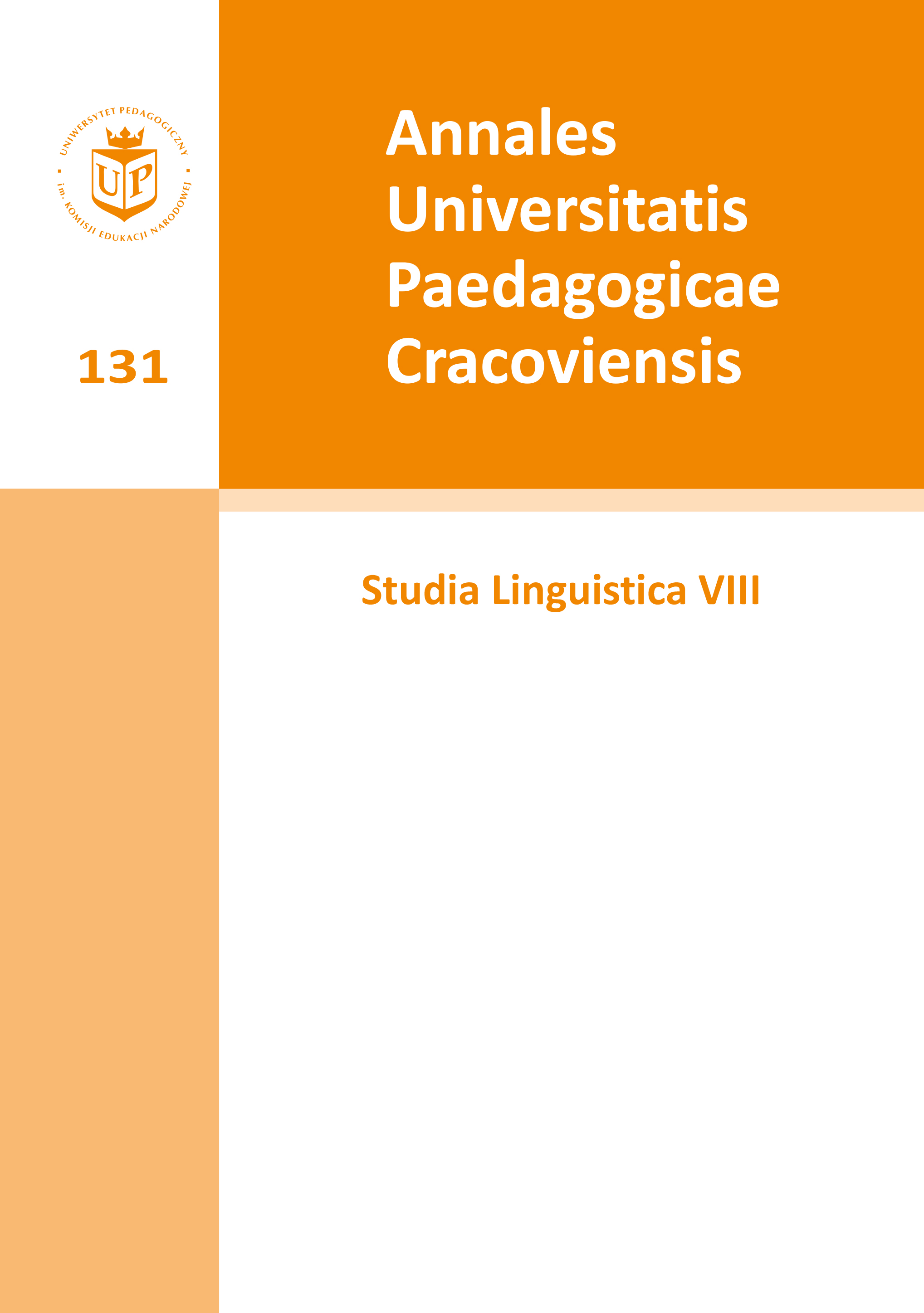O jedzeniu i pracy – na podstawie polskich przysłów
Main Article Content
Abstrakt
The selected proverbs point to the fact that eating is something obvious and natural, a repeated activity that aims at sating one’s appetite. Eating as a sign of life in proverbs has been contrasted with death. It is also a reward, payment for one’s work. However, some exceptions to this rule could be distinguished, including situations when: 1. one man works while another eats, i.e. “consumes” the fruit of the work of the former; 2. one eats but does not work, i.e. is a lazy person; 3. one works but does not eat, i.e. does not receive payment for his or her work, or the payment is unsatisfactory. Among the elements that build the linguistic picture of eating are the relations between eating and working: 1. work dominates eating, i.e. eating does not counterbalance the effort put in working, payment for work is insufficient (the point of view here is of a farmhand or a peasant); 2. eating dominates work, i.e. one eats more than one has worked for (one looses all the possessions, or falls into poverty); 3. balance is maintained between working and eating, i.e. one “eats up” everything that he or she has worked for. The linguistic picture of eating and working has been formed not only on the basis of life experience of many generations that reflects social hierarchy: gentry, peasantry (many proverbs present the viewpoint of a villager, a folklore bearer), but also under the influence of the Bible. This is because work is identified with a virtue, its aim is the maintenance and development of life, while not working (laziness) is a sin.
Downloads
Article Details
Autor, zgłaszając tekst do redakcji czasopisma „Annales Universitatis Paedagogicae Cracoviensis. Studia Linguistica”, zaświadcza, iż jest on rezultatem wyłącznie jego własnej twórczości, że treść artykułu nie była dotychczas publikowana oraz że utwór nie narusza w żadnym stopniu praw autorskich ani praw pokrewnych innych osób, jak również innych praw osób trzecich, a także, że niczyje prawa do utworu (lub jego jakiejkolwiek części) nie zostały pominięte. Po podpisaniu umowy prawa majątkowe do opublikowanych materiałów zostają przeniesione na Uniwersytet Komisji Edukacji Narodowej w Krakowie.
Rocznik „Annales Universitatis Paedagogicae Cracoviensis. Studia Linguistica” to czasopismo o otwartym dostępie, a cała jego zawartość jest udostępniana bezpłatnie dla użytkowników i instytucji na zasadach licencji Creative Commons CC-BY-NC-ND 4.0 (uznanie autorstwa, użycie niekomercyjne, bez utworów zależnych). Na podstawie tej licencji autorzy zgadzają się, że ich prace mogą być zgodnie z prawem ponownie wykorzystywane do jakichkolwiek celów, za wyjątkiem celów komercyjnych, bez konieczności uzyskania uprzedniej zgody ze strony autora lub wydawcy. Każdy może prace te czytać, pobierać, kopiować, drukować, rozpowszechniać oraz przetwarzać, pod warunkiem poprawnego oznaczenia autorstwa oraz oryginalnego miejsca publikacji. Publikowanych tekstów nie można wykorzystywać do tworzenia utworów zależnych (np. do tłumaczenia ich i publikowania w innym języku bez zgody wydawcy). Jest to zgodne z definicją otwartego dostępu BOAI (Budapest Open Access Initiative) „Studia Linguistica”nie pobiera opłat za składanie artykułów ani ich przetwarzanie.
Autor, przesyłając artykuł do redakcji „Studia Linguistica”, bezwględnie zgadza się z poniższymi punktami:
-
Oświadczam, że jestem Autorem lub Współautorem nadesłanego tekstu. Przesłany tekst nie był nigdzie publikowany, jest całkowicie oryginalny i nie narusza w żadnym stopniu praw autorskich ani praw pokrewnych innych osób, jak również innych praw osób trzecich, a także, że niczyje prawa do utworu nie zostały pominięte.
-
Oświadczam, że nadesłany tekst nie został złożony do recenzji lub/i publikacji w innym czasopiśmie.
-
Przyjmuję do wiadomości, że Autor ponosi pełną odpowiedzialność za każdy przypadek plagiatu, niezależnie od tego, czy został on wykryty podczas procesu recenzji, czy po publikacji w „Studia Linguistica”.
-
Oświadczam, że ponoszę pełną odpowiedzialność finansową i prawną za wszelkie roszczenia związane z utworem.
-
Potwierdzam uznanie wszystkich źródeł danych wykorzystanych i cytowanych w badaniach.
-
Potwierdzam, że artykuł został wykonany z należytą starannością zgodnie ze standardami edytorskimi „Studia Linguistica”.
Bibliografia
Brzozowska M., 2006, Zmiany semantyczne nazw związanych z pracą w nowych warunkach ustrojowych (na podstawie ankiet przeprowadzonych wśród studentów lubelskich uczelni w latach 1990 i 2000), [w:] Przemiany języka na tle przemian współczesnej kultury, red. K. Ożóg, E. Oronowicz-Kida, Rzeszów, s. 212–227.
Google Scholar
Długosz K., 2001, Językowy obraz chleba w Biblii i w przysłowiach, „Prace Filologiczne”, t. 46, s. 153–163.
Google Scholar
Kubiak I., Kubiak K., 1981, Chleb w tradycji ludowej, Warszawa.
Google Scholar
Mazurkiewicz M., 1990, Dwa spojrzenia na pracę. Perspektywa interpretacyjna a znaczenie słowa, [w:] Językowy obraz świata, red. J. Bartmiński, Lublin, s. 129–146.
Google Scholar
Mazurkiewicz-Brzozowska M., 1993, „Praca”. Wybrane warianty znaczenia słowa we współczesnej polszczyźnie i ich struktura kognitywna, [w:] Nazwy wartości. Studia leksykalno-semantyczne I, red. J. Bartmiński, M. Mazurkiewicz-Brzozowska, Lublin, s. 133–145.
Google Scholar
Головaнова А., 2003, Категория ценности и ее репрезентация в польской языковой картине мира, [w:] Język w kręgu wartości. Studia semantyczne, red. J. Bartmiński, Lublin, s. 163–169.
Google Scholar
